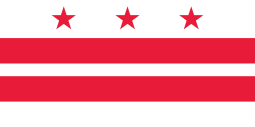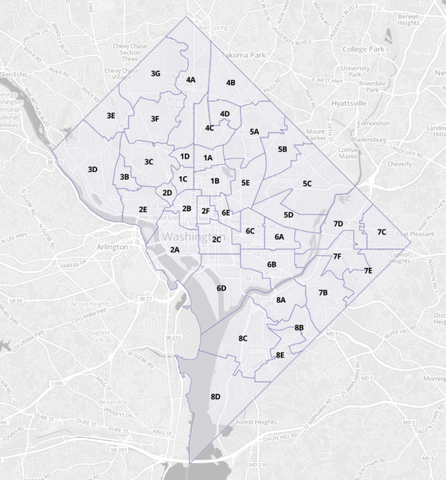Advisory Neighborhood Commission
Advisory Neighborhood Commissions are bodies of local government in District of Columbia. The ANC system was created in 1974 through a District referendum (73 percent voted "yes") in the District of Columbia Home Rule Act.[1] The first elections for Advisory Neighborhood Commissioners were held in the fall of 1975, and commissions began operating in 1976.[2] Congressman Don Fraser (D-Minn) and DC resident Milton Kotler helped to draft the ANC language in the District of Columbia Home Rule Act based on the success of Adams Morgan Organization (AMO) in Adams Morgan and on a 1970 report of the Minneapolis Citizen League, as well as on related neighborhood corporations in Pittsburgh, Brooklyn, Chicago and Columbus, Ohio.[3][4][5]
| Agency overview | |
|---|---|
| Formed | 1974 |
| Jurisdiction | District of Columbia |
| Headquarters | John A. Wilson Building, Washington DC |
| Parent agency | D.C. Council |
| Website | http://anc.dc.gov/ |
District of Columbia
|
|---|
 |
| This article is part of a series on the politics and government of District of Columbia |
|
Governance
|
|
Elections
|
|
ANCs consider a wide range of policies and programs affecting their neighborhoods, including traffic, parking, recreation, street improvements, liquor licenses, zoning, economic development, police protection, sanitation and trash collection, and the District's annual budget. Commissioners serve two-year terms and receive no salary, but commissions do receive funds for the general purpose of improving their area and hiring staff.[6] This policy has come under scrutiny because of the misuse of funds by commissioners and their employees.[7] Candidates can accept campaign donations up to $25 per person.[8]
Powers
The powers of the ANC system are enumerated by the DC Code § 1-207.38:
- May advise the District government on matters of public policy including decisions regarding planning, streets, recreation, social services programs, health, safety, and sanitation in that neighborhood commission area;
- May employ staff and expend, for public purposes within its neighborhood commission area, public funds and other funds donated to it; and
- Shall have such other powers and duties as may be provided by act of the Council.
The ANCs present their positions and recommendations on issues to various District government agencies, the Executive Branch, and the Council. They also present testimony to independent agencies, boards, and commissions, usually under the rules of procedure specific to those entities. By law, the ANCs may present their positions to Federal agencies. One of the most common cases of ANC involvement is in the giving of liquor licenses, where the approval or disapproval of the commission, despite having no legal power, represents a veto to the district government.[9]
Membership and qualifications
Each ANC Commissioner is nominated and elected by the registered voters who reside in the same Single Member District as the candidate. The ANC Commissioner is an official representing his or her neighborhood community (Single Member District) on the Advisory Neighborhood Commission.
In order to hold the office of Advisory Neighborhood Commissioner, an individual must be a registered voter (or must be able to register to vote within two years) in the District, as defined by DC Code Section 1-1001.02; have resided continuously in the Single Member District from which he is nominated for the 60-day period immediately preceding the day on which the nominating petition is filed; and hold no other public office. In order to enter the public ballot, they must receive 25 signatures from registered voters in their district.[10]
Single Member Districts

The basic area of Advisory Neighborhood Commissions are Single Member Districts. There are 299 Single Member Districts,[11] which in turn are subdivisions of 39 'Commission Districts',[12] which are in turn subdivisions of Wards. Each Commissioner represents about 2,000 residents in their Single Member District (SMD) area.
Due to population growth and redistribution, these boundaries often change, causing shifts in power and election turnout.[13]
Single Member Districts are named according to Ward, Subdivision, and then Single Member District. For instance, 3B05 is Ward 3, subdivision B, and SMD 05.
Ward 1
- 1A - Columbia Heights, Park View, Pleasant Plains
- 1B - U Street, Cardozo, Howard University, Pleasant Plains, LeDroit Park, Shaw
- 1C - Adams Morgan, Kalorama Heights, Lanier Heights, Western U Street
- 1D - Mount Pleasant
Ward 2
- 2A - Foggy Bottom, West End
- 2B - Dupont Circle
- 2C - Chinatown, Penn Quarter
- 2D - Kalorama, Sheridan
- 2E - Burleith, Georgetown, Hillandale
- 2F - Logan Circle
Ward 3
- 3B - Cathedral Heights, Glover Park
- 3C - Cathedral Heights, Cleveland Park, Massachusetts Heights, McLean Gardens, Woodley Park
- 3D - American University, Foxhall, Kent, The Palisades, Spring Valley, Wesley Heights
- 3E - American University Park, Friendship Heights, Tenleytown, Wakefield, Chevy Chase, Ft Gaines
- 3F - Forest Hills, North Cleveland Park, Tenleytown, Wakefield
- 3/4G - Chevy Chase
Ward 4
- 4A - Brightwood, Colonial Village, Crestwood, Shepherd Park, Sixteenth Street Heights
- 4B - Brightwood, Lamond-Riggs, Manor Park, Riggs Park, South Manor Park, Takoma, Fort Stevens Ridge
- 4C - Columbia Heights, Petworth, Sixteenth Street Heights
- 4D - Petworth, Brightwood Park
Ward 5
- 5A - North Michigan Park, Michigan Park, Fort Totten, Pleasant Hills, Fort Totten Park, parts of Catholic University and other Catholic Institutions, parts of Riggs Park
- 5B - Brookland, University Heights, parts of Woodridge, parts of Queens Chapel, parts of Michigan Park
- 5C - Langdon, Fort Lincoln, Brentwood, Arboretum, Gateway, Mt. Olivet Cemetery
- 5D - Carver Langston, Trinidad, Gallaudet University, Ivy City, Capital City Market
- 5E - Bloomingdale, Edgewood, Eckington, Truxton Circle, Glenwood/St. Mary's Cemeteries, McMillan Sand Filtration Site
Ward 6
- 6A - North Lincoln Park, Rosedale, H St. corridor (eastern half)
- 6B - Barney Circle, Capitol Hill (southern half), Eastern Market
- 6C - Near Northeast, NoMa, Union Station, H St. corridor (western half)
- 6D - Carrollsburg, Fort McNair, Navy Yard, Near Southwest/Southeast, Waterfront
- 6E - LeDroit Park, Mount Vernon Triangle
Ward 7
- 7B - Dupont Park, Fairfax Village, Greenway (part), Hillcrest, Naylor Gardens, Penn Branch, Randle Highlands, Twining
- 7C - Benning Heights, Burrville, Deanwood, Grant Park, Lincoln Heights
- 7D - Eastland Gardens, Kenilworth, Kingman Park, Mayfair, River Terrace
- 7E - Benning Ridge (part), Capitol View, Fort Davis, Marshall Heights
- 7F - Benning Ridge (part), Fort Dupont, Greenway (part)
Ward 8
- 8A - Anacostia, Fairlawn, Fort Stanton, Hillsdale
- 8B - Garfield Heights, Knox Hill, Shipley Terrace
- 8C - Barry Farm, Bolling Air Force Base, Congress Heights, St. Elizabeths Hospital
- 8D - Bellevue, Far Southwest
- 8E - Congress Heights, Valley Green, Washington Highlands
See also
References
- Garrison, David F. (2011). "District of Columbia's Elected Advisory Neighborhood Commissions: An Unlikely Experiment in Governance at the Grassroots". State & Local Government Review. 43 (2): 159–166. doi:10.1177/0160323X11416074. JSTOR 41303187.
- Garrison, David F. (2011). "District of Columbia's Elected Advisory Neighborhood Commissions: An Unlikely Experiment in Governance at the Grassroots". State & Local Government Review. 43 (2): 159–166. doi:10.1177/0160323X11416074. JSTOR 41303187.
- Gibson, Josh; Nahikian, Marie (March 23, 2020). "A Minnesota congressman is one reason we have ANCs. But the true inspiration was the spirited tradition of activism of Adams Morgan". The DC Line.
- Garrison, David F. (2011). "District of Columbia's Elected Advisory Neighborhood Commissions: An Unlikely Experiment in Governance at the Grassroots". State & Local Government Review. 43 (2): 159–166. doi:10.1177/0160323X11416074. JSTOR 41303187.
- Kotler, Milton. "ECCO bene: Organizing Neighborhood Government Milton Kotler—father of the ANC".
- "Employment Opportunities". DC Government. Archived from the original on 10 October 2016. Retrieved 20 October 2016.
- DeBonis, Mike (2012-04-27). "William Shelton gets 30 days for theft of ANC funds". Washington Post. Retrieved 22 January 2013.
- "ANC Elections". DC Government. Retrieved 24 January 2013.
- DePillis, Lydia. "With Liquor License, Trailblazing Big Bear Runs Into a Thicket". Washington City Paper. Retrieved 22 January 2013.
- Ivey, Keith. "Run For ANC". Archived from the original on 2012-10-12. Retrieved 2013-01-23.
- Sommers, Will. "Who is the worst ANC member". Washington City Paper. Retrieved 24 January 2013.
- "Learn about Wards and ANCs". DC Council. Washington, DC. Archived from the original on 2013-01-15.
- Debonis, Mike (November 19, 2012). "D.C.'s closest ANC races are now less close". Washington Post. Retrieved 22 January 2013.